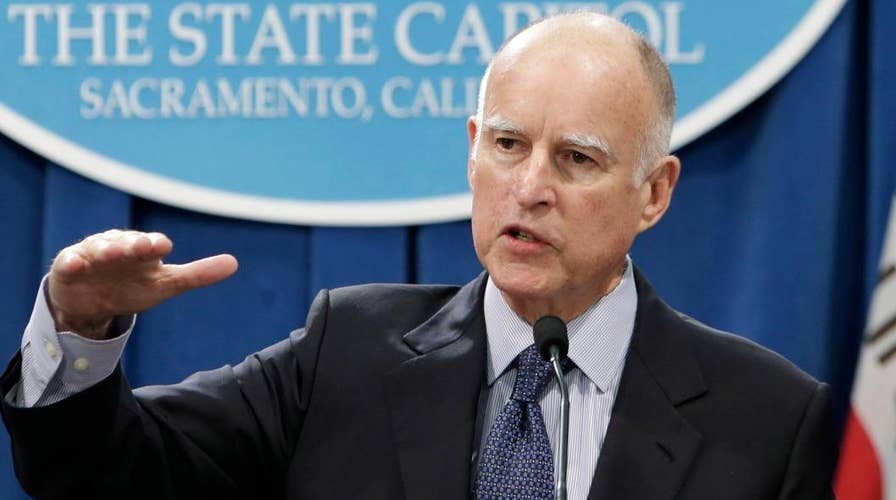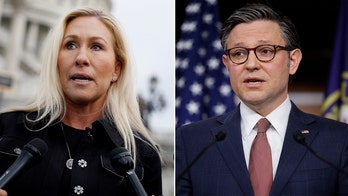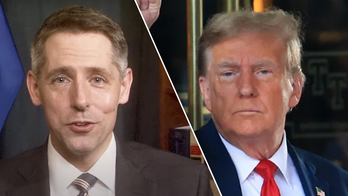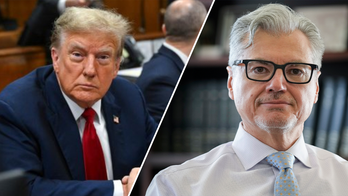Is Jerry Brown killing California? Part 1: Immigration
Fox News contributor Tomi Lahren, California congressional candidate Antonio Sabato, Jr., California Congressman Brad Sherman and former California Governor Gray Davis join Steve Hilton to debate Brown's immigration policies.
California Gov. Jerry Brown vetoed two bills Thursday that would have allowed noncitizens, including undocumented immigrants, to serve on state boards and commissions, and would have prevented immigration authorities from making arrests inside courthouses.
Brown’s actions come as California has sparred with the Trump administration over its perceived accommodation of illegal immigrants. An estimated 2 million people reside in the state illegally, the Orange County Register reported.
“Governance belongs to a nation’s citizens,” said Mike Spence, a councilman in the Southern California city of West Covina. “Even Jerry Brown understands citizenship has to mean something.”
“Governance belongs to a nation’s citizens. Even Jerry Brown understands citizenship has to mean something.”
Trump has voiced his frustration with California’s immigration policies, calling them “unconstitutional” and “illegal.” Several California cities have voted to opt out of the state’s sanctuary law.
Had Brown, a Democrat, signed SB-174, California would have been the first state in the country to allow legal residents and undocumented immigrants to serve on local and state boards that advise on policy areas such as employment and labor, the Register reported.
“I believe existing law, which requires citizenship for these forms of public service, is the better path,” Brown said in explaining his veto.
The proposed law would have eliminated “transient aliens” from the government code in an effort to make clear that anyone can hold an appointed civil office regardless of citizenship or immigration status.
The phrase is included in an 1872 provision intended to exclude Chinese immigrants and other foreign-born residents from holding appointed civil positions, the Los Angeles Times reported.
The bill’s authors, state Sen. Ricardo Lara and Assemblywoman Wendy Carrillo, both Democrats, said the language conflicts with the 14th Amendment, which guarantees citizenship to those born or naturalized in the United States.
“There was a time when Chinese Americans, Japanese Americans, African Americans, and Catholics were prevented from serving, and California cleared away those barriers,” Lara said. “I predict that this barrier will eventually fall.”
Lara also authored the other bill that Brown vetoed Thursday, the one that sought to prevent immigration authorities from making arrests inside courthouses.
In his veto message, Brown expressed concerns that the proposed law could have unintended consequences. He pointed to the state’s sanctuary law, which limits cooperation between local and state law enforcement agencies and immigration authorities, according to the L.A. Times.
“I believe the prudent path is to allow for that guidance to be released before enacting new laws in this area,” Brown said.
The bill would have allowed judges to stop the arrests or other activities that interrupt their proceedings.
Brown has vetoed other bills passed by the California’s Democratic-controlled Legislature. In 2013, he vetoed one that would have allowed non-citizens to serve on juries.
“Jury service, like voting, is quintessentially a prerogative and responsibility of citizenship,” he said at the time.
California has passed several laws in recent years designed to protect the rights of immigrants. Last week, Brown signed a bill authored by Lara into law that decriminalizes sidewalk vending, a business popular with many immigrants.





